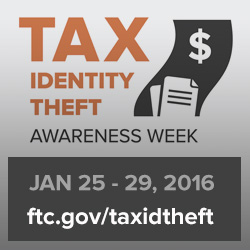 As Tax season approaches make sure that you do not fall victim to the fraud and scams that abound. Listed below are some of the events that are being hosted by the Federal Trade Commission and its partners on how to minimize your risk what to do if your identity is compromised.
As Tax season approaches make sure that you do not fall victim to the fraud and scams that abound. Listed below are some of the events that are being hosted by the Federal Trade Commission and its partners on how to minimize your risk what to do if your identity is compromised.
• January 26, 2 p.m. – an FTC webinar for consumers, co-hosted AARP’s Fraud Watch Network and Tax Aide Program. Learn how tax identity theft happens and what you can do if it happens to you.
• January 27, 11 a.m. – the FTC and the Department of Veterans Affairs (VA) will host a Twitter chat with information about tax identity theft for veterans. Join the conversation at #VeteranIDTheft.
• January 27, 2 p.m. – the FTC, TIGTA and the VA will host a webinar with information about tax identity theft for veterans.
• January 28, 1 p.m. – the FTC and the IRS will co-host a webinar with information to help victims of tax identity theft.
• January 29, 2 p.m. – the FTC and the Identity Theft Resource Center will co-host a Twitter chat about tax ID theft. Join the conversation at #IDTheftChat.
For more information on each of these events go to the Federal Trade Commission website. You can also visit www.IdentityTheft.gov, the government’s one-stop resource to help identity theft victims recover.
* The information contained in this Blog is intended for general information and educational purposes only and does not constitute legal advice or an opinion of counsel.

 As Tax season approaches make sure that you do not fall victim to the fraud and scams that abound. Listed below are some of the events that are being hosted by the Federal Trade Commission and its partners on how to minimize your risk what to do if your identity is compromised.
As Tax season approaches make sure that you do not fall victim to the fraud and scams that abound. Listed below are some of the events that are being hosted by the Federal Trade Commission and its partners on how to minimize your risk what to do if your identity is compromised.


